Accredited By
Your One-Stop Solution for Healthcare Software Development
-
Custom Software DevelopmentWe develop customized software solutions for health care organizations according to specific needs, enhancing effectiveness and experience.
-
Telehealth SolutionsOur telehealth applications offer remote consultations and thereby make services more accessible and encourage patient engagement.
-
Electronic Health Records (EHR)We develop robust EHR systems that ease a patient's data management by giving assured access with complete adherence to regulatory standards.
-
Healthcare Mobile AppsOur mobile app development service enables both patients and providers with monitoring, information access, and ability to communicate with one another.
-
Healthcare Data AnalyticsWe offer data analytics solutions for healthcare providers' effective reporting and decision-making, right resource allocation, and better patient outcomes.
-
Interoperability SolutionsOur interoperability services ensure that different health care systems can be easily exchanged to improve collaboration and care delivery.
Step 1 of 13
Hello, I'm Your AI Design Partner
I'll help you transform your product ideas into clear UI/UX blueprints. Let's get started by defining your vision.
Define Your Audience
Choose the option that best describes the end-users of your product.
What industry is your product for?
Select an industry to help us tailor your blueprint.
Healthcare & Wellness
Finance & Fintech
E-commerce & Retail
Education & E-learning
Social & Community
Productivity & Tools
Travel & Hospitality
Entertainment & Media
Others
What is your specific focus?
Select one to continue.
What platforms do you want to target?
Choose where your users will access your product. Select all that apply.
Web Application
Desktop browsers, responsive web app
Mobile Apps
Native iOS and Android applications
Web + Mobile
Both web and mobile with shared codebase
Others
Specify your custom platform requirements
Define your project stage
This helps us tailor the blueprint to your specific needs.
User Base Assessment
This helps us tailor the blueprint to your product's current stage.
Do you have an existing user base for this product?
Let's Start with Your Core Idea
Provide a detailed description of your app or website. The more detail you give our AI, the better the blueprint will be.
0 characters
When do you want your product to be ready for launch or testing?
Choose Your Technology Stack
Select your preferred stack or let our AI suggest one.
AI-Generated Features
Our AI has analyzed your requirements and pre-selected relevant features. Deselect any features you don't need.
Generating Your Features...
Our AI is analyzing your requirements to create a personalized feature list.
Generation Failed
Unable to generate features. Please try again.
Add a Custom Feature
AI Recommendations
Loading recommendations...
Project Requirements Summary
Review the generated summary below. Expand each section to see the details.
emoji_objects
Core Concept & Goal
expand_more
Core Concept & Goal
Loading...
groups
System Type & Industry
expand_more
System Type & Industry
- Loading...
checklist
Selected Features
expand_more
Selected Features
- Loading...
devices
Platforms & Technology
expand_more
Platforms & Technology
- Loading...
schedule
Timeline & Project Stage
expand_more
Timeline & Project Stage
- Loading...
Your Blueprint is Ready!
Thank you for using our tool! Your personalized blueprint is now complete. We're excited to see your idea come to life.
Let's review your blueprint and discuss the next steps with one of our experts.

Our Healthcare Software Development Capabilities
-
Cloud-Based Solutions
We develop cloud-based applications to offer secure data storage with easy access, allowing healthcare organizations to scale and ensure reliable delivery. -
Compliance and Security
In addition to that, we ensure that our healthcare software is compliance-focused, strictly adhering to industry regulations such as HIPAA, and providing the highest levels of data security. -
Integration with Existing Systems
We offer integration services to ensure that the newly incorporated software solution will run smoothly with the current systems in place to minimize disruptions and maximize efficiency. -
UX/UI Design
We have a research-oriented design team, focusing on intuitive interfaces, which create augmented user experience throughout our software solutions-for health care providers and patients, respectively.

Why Choose Citrusbug for your Healthcare Software Development?

Transparency & Integrity
We exhibit integrity and transparency at the top-notch level by protecting your intellectual ideas through strict NDA rules.

On-time Delivery
Hire Experienced programmers from Citrusbug and have peace of mind as our developers follow a strict schedule to deliver milestones on time.

Cost-Efficient
We at Citrusbug follow the mantra of delivering solutions of the highest quality at the most cost-effective prices to all our clients.

Vast Technical Knowledge
Our developers possess years of experience when it comes to SaaS development which helps us to offer state-of-the-art SaaS solutions

QA And Testing
We offer A-grade QA and testing services where our QA experts ensure that the final product is bug-free and ready for the final launch.

24X7 Availability
Resolve all your queries by contacting our experts around the clock. Reach our experts via text, email, Skype, call, etc.

Do you need an expert opinion or advice for your software development?
If so, connect with us now for a free consultation call. Our solution architects and CTO can nudge you towards success.
Some Top-Notch Healthcare Projects We Built
Advinow revolutionizes healthcare through automation & artificial intelligence (AI), bringing technology and process design to patient engagement and provide consultation. The HIPAA-compliant platform helps providers deliver an excellent on-demand experience while accelerating operations for urgent care.
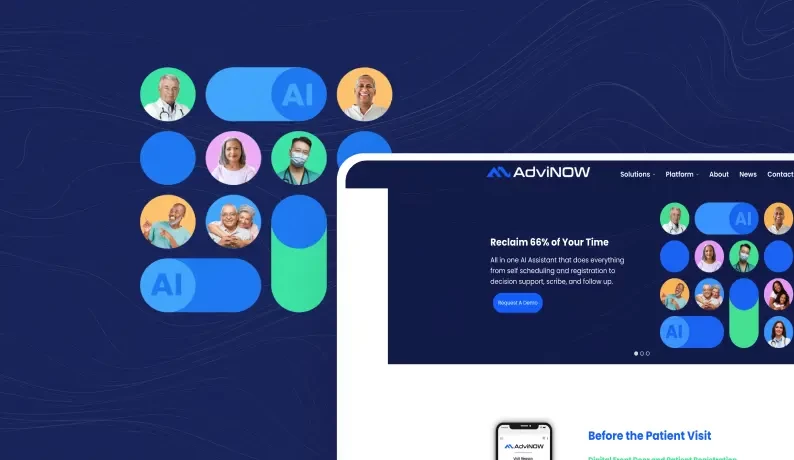
A platform to help healthcare organizations run on Auto-Pilot. It is a zero-code, omni-channel, and AI-powered virtual assistant that automates & connects healthcare workflows across the patient journey, including faxes, phone & SMS, secure email, scheduling, prior authorizations, payments and more!
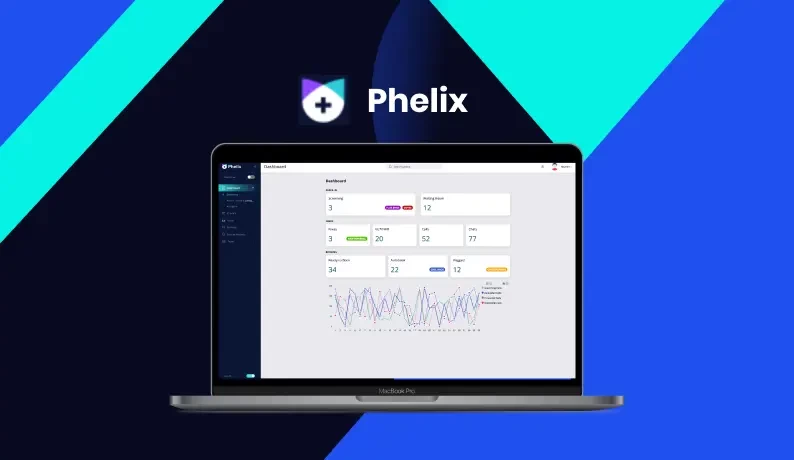
Droice Hawk is a HIPAA/GDPR-compliant AI middleware that losslessly converts raw, messy patient data like EHR, labs, claims, etc. into analysis-ready form for clinical trials. Hawk fills this industry gap by losslessly processing RWD. Hawk’s enterprise infrastructure enables scalable, reproducible, and traceable RWD with quantifiable data quality for reliable evidence generation.
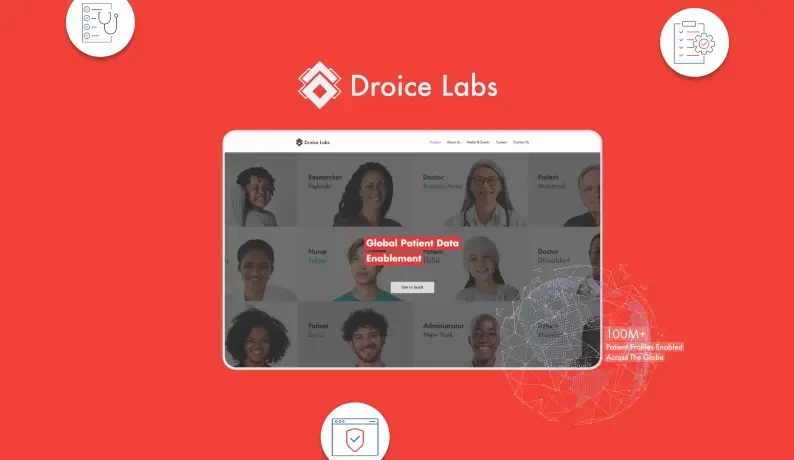
Client Testimonials (We're Rated 4.3 on Clutch)
FAQs
Healthcare software refers to all digital tools designed to manage patient information, to promote the efficient delivery of care, and to run healthcare facility activities while ensuring compliance.
Customized software development is important because it meets specific needs, improves efficiency, boosts patient care, and ensures compliance with regulations about privacy and security.
Healthcare software development companies provide tailor-made solutions to promote patient care, automate the workflow, and ensure regulatory compliance and information management for health-care organizations.
The costs of developing a healthcare IT system depend on complexity, features, and specific requirements needed to meet the healthcare facility's goals and regulations.
Yes, we ensure that your apps are safe, up-to-date status, and optimized performance through our support and maintenance after the launch.
Use Cases of AI in Healthcare and Implementation Strategies and Future Trends
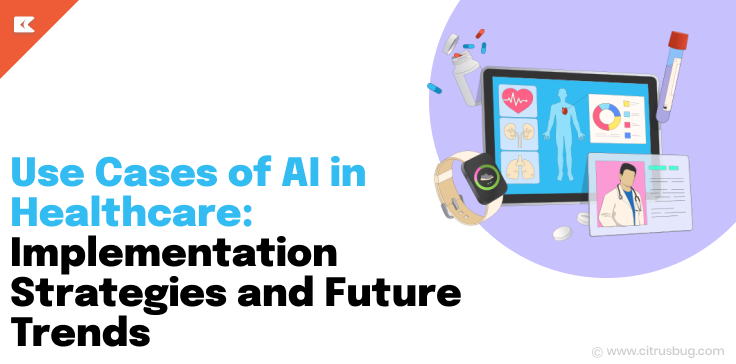
The rapid development of AI impacts many sectors, and healthcare is probably one of the most heavily affected sectors. AI has the full potential to transform healthcare systems, improve patient outcomes, and ensure that providers have more efficient workflows. All use cases of AI include everything from diagnosis and treatment planning to personal medicine. It must be remembered that the healthcare industry has already integrated AI; thus, such development would only come in handy if healthcare professionals and technology developers were aware of these use cases, implementation strategies, and future trends.
Introduction to AI in Healthcare
Apart from assisting doctors in diagnosing patients, healthcare has brought AI outside research and development to optimize administrative processes, advance drug development, improve image-based medical scanning, and even customize approaches to treatment based on individual data. AI is exceptionally powerful at analyzing vast datasets, detecting hidden patterns, and providing actionable insights that human practitioners often miss.
The need for AI technologies and systems has been recognized in the healthcare sector as modern healthcare software development nowadays incorporates AI into the platform. Innovative solutions provided by AI deal with long-standing problems such as inefficiency, variability, and high costs in the care of patients.
Key Use Cases of AI in Healthcare
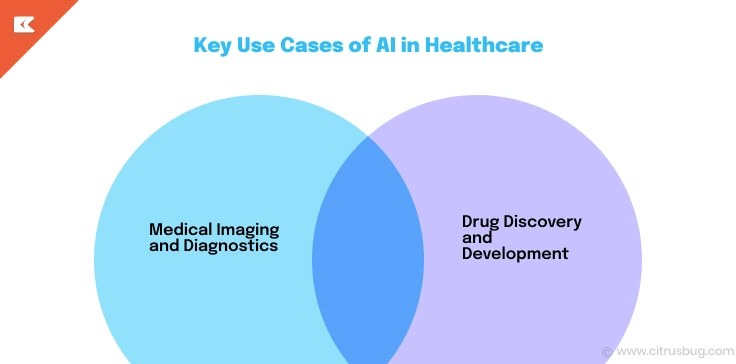
Medical Imaging and Diagnostics
The most visible application of AI in health is in medical imaging and diagnostics. Now, with AI, one can scan images like X-rays, MRIs, CT scans, and any other representative human body images for some kind of anomaly like tumors or fractures with comparatively high accuracy. This works well because algorithms like CNNs assist radiologists in reaching a diagnosis faster and more accurately.
For instance, AI systems are excellent in the early detection of cancer that probably no human eye can detect. AI algorithms are remarkably accurate in the detection of diseases like lung cancer, surpassing conventional practices.
Example: Google’s DeepMind has unveiled that it has developed computers with artificial intelligence that can identify more than 50 types of eye diseases based on OCT scans with almost human-like accuracy.
Drug Discovery and Development
AI has transformed the Pharmaceutical landscape from breaking barriers to accelerating drug discovery and development. That old-fashioned drug discovery approach takes years and costs millions of dollars, but with AI, all this gets done within a much smaller time frame and reduces the resources required; all this is done by identifying the potential drug candidates.
Example: IBM Watson has also been employed in drug discovery in as much as it can analyze gigantic datasets and suggest possible treatments, saving ample time and money.
Personalized Medicine
The other primary application of AI in healthcare is personalized or precision medicine. AI can consider genetic, lifestyle, and environmental data to develop customized treatment plans specific to a patient’s needs. This has proved extremely useful in oncology as AI-driven models can analyze how a patient will respond to specific treatment options so that the doctor can make wiser choices.
With genomics data combined with AI, healthcare providers will be able to prescribe treatments that would have the maximum effect while minimizing the chance of triggering adverse effects. Thus, this advancement also leads to the development of applications like healthcare SaaS, which may carry in real-time the analysis of patient data to provide doctors with actionable insights toward better patient care.
Virtual Health Assistants and Chatbots
AI-powered virtual health assistants and chatbots have indeed transformed patient engagement with a 24/7 support system, fast answers to any medical-related questions, and guiding a patient through treatment protocols. These AI track a patient’s symptoms, remind them when to take their medicine, and can even schedule an appointment for the patient with the health provider.
These virtual assistants employ natural language processing (NLP) to understand patient queries and provide correct information. These not only relieve healthcare professionals of part of their workload but also ensure that patients receive proper and timely information.
Example: Ada is a health app powered by an AI device that aims to enable patients to understand their symptoms and provide possible causes based on an extensive medical knowledge base.
Predictive Analytics for Preventive Healthcare
AI would truly prove to be revolutionary in preventive care. AI can make predictions of the development of a disease or health condition based on historical data. Healthcare providers can then determine who is at risk and create a customized preventive care plan to ensure a much better health outcome in the long run.
For example, AI algorithms can scan data from wearables and EHRs to monitor heart health in real-time and pattern out where an increased risk of cardiovascular diseases may be identified.
Example: By using AI models, the probability that a patient might develop certain conditions like diabetes can be predicted, and this gives doctors a chance to intervene early with either recommendations on lifestyle or treatments.
Implementation Strategies for AI in Healthcare
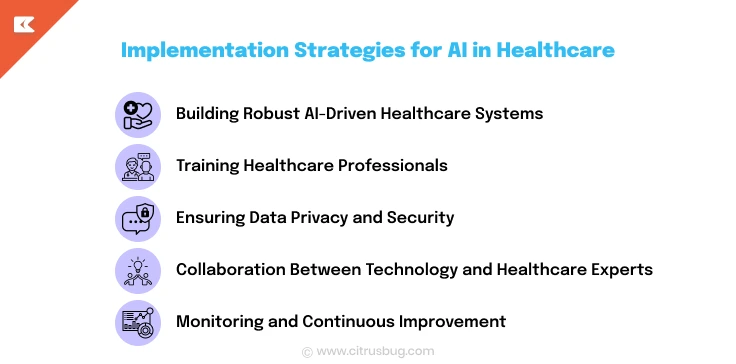
Indeed, the successful integration of AI in health care is dependent on thoughtful planning, close cooperation among healthcare providers and technologists, and appropriate technological infrastructure. And here’s how to key implement such strategies:
Building Robust AI-Driven Healthcare Systems
Healthcare providers must invest in healthcare software development that leverages AI technologies to streamline workflows and enhance patient outcomes. Development of high-quality systems that can deal with handling large data sets, integrated, and giving real-time inputs are some of the essentials in having successful implementation.
These systems also need to have user-friendly interfaces to support healthcare professionals in easy access to and interpretation of AI-derived insights. Collaboration with experienced developers and AI specialists will enable the creation of scalable and secure platforms that can be adapted to changes in AI technology.
Training Healthcare Professionals
Proper deployment of AI in healthcare cannot be executed without training health professionals who are to work together with such applications. Physicians, nurses, and administrative staff need to become acquainted with how the AI system operates and what to look for in its output.
This requires investments in education and training programs focused on the practical applications of AI in clinical settings. The better healthcare professionals understand AI, the better they are able to use it to improve patient care and outcomes.
Ensuring Data Privacy and Security
Since AI is very data-intensive, in the healthcare sector, protection of sensitive information about patients is paramount. Strategies on implementing AI models must focus on data privacy and security. Therefore, protecting patient data through anonymization and secure data-sharing protocols are crucial for making it possible for AI models to intelligently process it.
Collaboration Between Technology and Healthcare Experts
The implementation of AI in health care doesn’t end with choosing the correct technology; it is equally important to collaborate with healthcare providers, data scientists, and AI specialists. True success would involve multidisciplinary teams with medical expertise accompanying them with technical and data science knowledge to be able to create solutions addressing real-world healthcare challenges.
Monitoring and Continuous Improvement
Once developed, these AI systems will need continuous monitoring and improvement based on the feedback available in real-time. Medical knowledge would be considered and, through regular updates, flowed through to the AI models, ensuring continuation without loss of accuracy and reliability. Monitoring can also catch biases in the AI models that may imply a negative effect on patient care.
Future Trends in AI and Healthcare
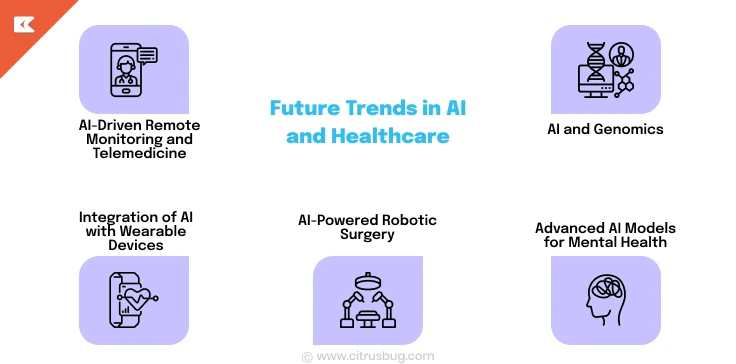
As AI continues to evolve, new trends will emerge, shaping the future of healthcare delivery. Here are some key trends to watch:
AI-Driven Remote Monitoring and Telemedicine
Telemedicine is an area that COVID-19 has seen rapid growth and adoption in. With more support of AI, more improvements are being done concerning the provision of remote care. They are AI-driven remote monitoring tools that track the real-time health metrics of patients and alert the health professionals in case of the need for intervention to be taken.
AI-powered telemedicine services have made it easier for doctors to meet with patients virtually. In this scenario, there will be actual or real time patient data with analysis.
Integration of AI with Wearable Devices
This makes the wearable health device increasingly sophisticated, where AI would amplify all these devices’ capabilities of data tracking. In the future, AI will fully enable wearables in monitoring not only basic health metrics but also predictive analytics in preventive healthcare. Advanced monitoring capabilities in these wearables will help its users track continuously the vital signs of the user, detect early symptoms, and recommend preventive actions before more significant health problems develop.
AI-Powered Robotic Surgery
Robotic surgery is already a reality; however, with AI added to this technology, it will be more accurate and efficient in the short term. The AI algorithms will help doctors analyze real-time data, suggest effective techniques, and even automate portions of the procedure. This could minimize or eliminate errors and promote better patient outcomes.
Advanced AI Models for Mental Health
Early detection and intervention of mental health conditions with the help of available tools improves mental health care because more mental health platforms operate through AI. This means AI can evaluate speech patterns, social media activity, and other data points to detect signs that one may have a mental health condition like depression or anxiety early on. Therefore, in the future, AI models will also become more effective in preparing and individually prescribing mental health treatment plans and helping therapists deliver better care.
AI and Genomics
AI is sure to come into vital play in genomics unlocking fully, for the first time, the treasure trove of genetic data toward the delivery of personalized medicine by healthcare providers. In analyzing vast amounts of genomic data, AI will figure out which markers are relevant to various diseases, thus enabling doctors to diagnose their patients at an earlier stage and develop more targeted strategies for treatment.
Conclusion
The use cases of AI are enormous and are indeed showing signs in the health sector. From better diagnostics and personalized treatment plans to optimizations of administrative processes, enhanced drug development, and much more, AI is driving the next wave of healthcare innovation.
This will be an era of continuous advancement for AI technologies, and the AI software development solutions are going to provide key input for healthcare systems in adapting to these new interfaces. Health care providers will ensure that the respective systems function without glitches and would maximize patient outcomes with the assistance of these AI-based tools becoming integrated into existing infrastructures. The future of healthcare lies in intelligent data-driven solutions, and for healthcare organizations to stay in the competition arena, they have to embrace AI, invest in the right AI software development solutions, and remain ahead of the emerging trend.


 AI Chatbot Development Company
AI Chatbot Development Company AI Software Development Solutions
AI Software Development Solutions Custom NLP Solutions
Custom NLP Solutions Generative AI Development
Generative AI Development Machine Learning Consulting Services
Machine Learning Consulting Services MLOps Consulting Services
MLOps Consulting Services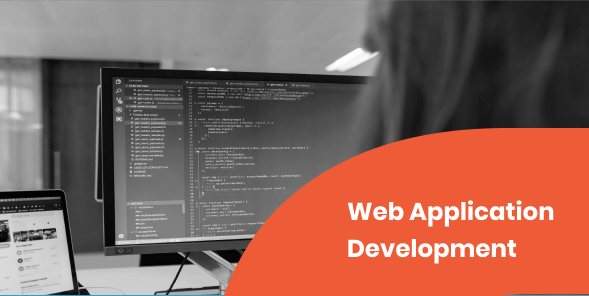

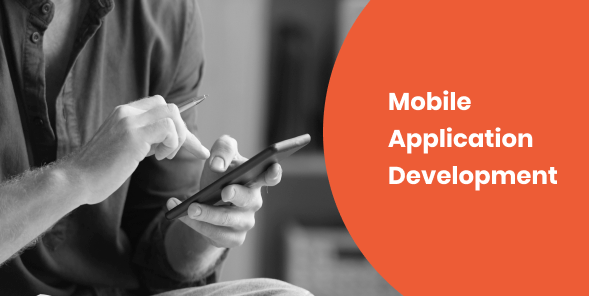
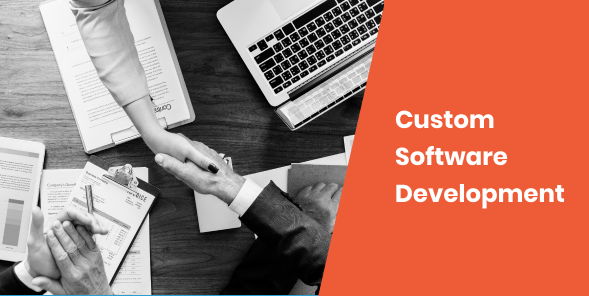












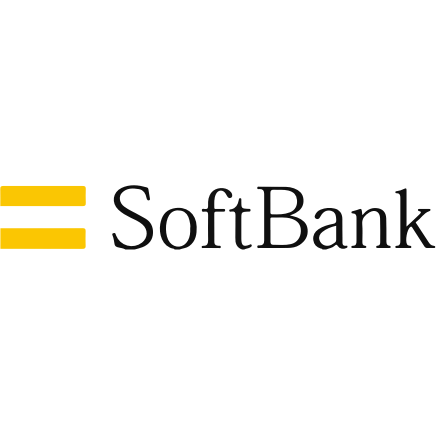

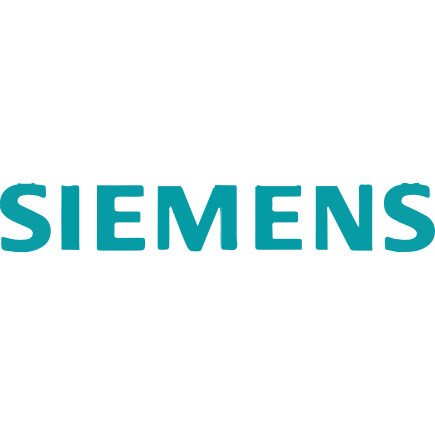


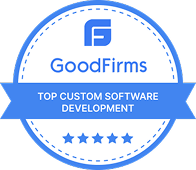

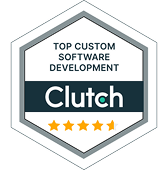

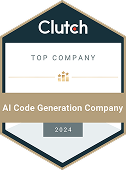
 BOOK A 30 MIN CALL
BOOK A 30 MIN CALL 





